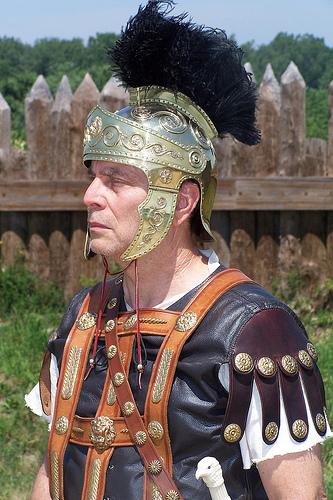Thanks to those who commented on this post from my Facebook page; I’m still figuring out how to make the comments from FB available to all readers of the WordPress blog. If there’s a way to make them migrate, maybe somebody will take pity on this tech-challenged crazy uncle and let me know. For those of you who don’t know me on Facebook, I’ll figure out today or this weekend how to make these blog posts and their comments public on my FB page. Or, just friend me. Neill Morgan is my real name.

Here is an authentic photo from the first century of a Roman soldier. Great resolution for the time, don’t you think?
Roy put forth the hypothesis that Mary’s pregnancy was the result of a rape by a Roman soldier. To fill out this hypothesis a bit, a New Testament scholar would point to the Roman occupation. Rape by soldiers was common and unpunished; that is, the soldier was not officially punished for his crime. The girl or woman who was known to have been raped, especially if she became pregnant, would have received dishonor, insult upon injury from at least some of her community. So would her family.
If it is the case that a rape haunts the historical backdrop of Mary’s pregnancy, we would have to assume that Luke expected his first readers to understand his subtext. The theological claim in this context is consistent with Luke’s explicit agenda: that God takes the power of evil and oppression (especially the power of the Roman government) and turns it against evil. The crucifixion leads to resurrection, the destruction of the temple leads to the spiritual temple of Jesus’ resurrected body and the spread of the good news to every corner of the world. A rape by a Roman soldier leading to the conception of God in human flesh fits in nicely with Luke’s theology of the cross, of God taking injustice and, in a kind of spiritual jujitsu, turning it into a powerful good: “We are getting what we deserve,” says the criminal crucified next to Jesus, “but this man has done nothing wrong.”
Ultimately, however, I am skeptical.
I’m partly skeptical because I don’t want to do unto others what I would not want done unto me. I don’t buy it when someone else begins with his or her own theology and works backward into the text. If I do that to someone else, someone who does not share my theology, it will feel forced, like retrofitting: “If God didn’t mean for us to have iPhones, God wouldn’t have given us thumbs!”
I’m also skeptical because I can’t find any textual evidence that Luke intended in this story to address the issue of the rape of Jewish girls and women by soldiers. Luke explicitly places his story in the context of the Roman occupation, when Herod was the puppet king, Augustus was Emperor, and Quirinius was governor of Syria. He often addresses the issue of the confiscation of property and injustice perpetrated by Herod’s puppet regime. But, he never addresses the rape issue. Luke can be subtle, but he’s never opaque.
Primarily, I’m skeptical because I don’t see any evidence that plausibility was a priority for Luke. The historical explanation of rape by a Roman soldier, or a scientist’s explanation of natural parthenogenesis, reach for plausibility.
Luke’s agenda was not plausibility, but meaning through mystery.
Christine’s comment, “Why does everything have to be about science?” gets to this issue. I love science. Science helps me make sense of this world. Evolutionary Science has helped me eat healthier and find an exercise program that works for me. Medical science saved my life at least once.
But, I don’t think Luke, even though he was a physician according to legend, had a scientific world view. He lived in a pre-scientific age.
The crazy uncle approach to scripture attempts to understand the biblical writer’s agenda by entering into his or her context to the extent that we can. That’s where I’m going in my next post, taking a look at Luke’s historical, cultural, and literary context. From there, we will have a clearer view of the meaning of Luke’s theological claim in this story of Jesus’ conception and birth.
Here’s my question for you: To what extent does it matter to you whether Luke intended to tell the story of Jesus’ birth as an accurate historical account, or intended to tell this story as it was shaped by his experience of faith and his desire to share that faith with his readers?


